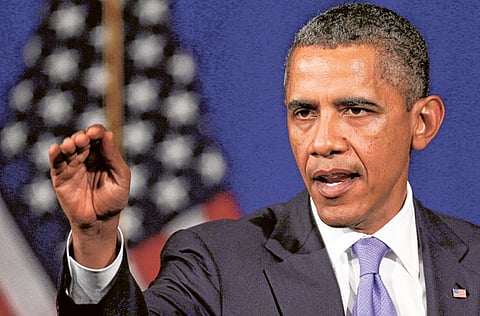Obama faces big battles on tax cuts
Team Obama says the president did the best possible job and produced the least harmful outcome in the debt-ceiling crisis

Team Obama says the president did the best possible job and produced the least harmful outcome in the debt-ceiling crisis, given the bad hand he was dealt. It's not clear if this is typical spin or a real self-assessment.
If genuine, it augurs poorly for the big battles ahead with the congressional super committee when it comes to decisions about larger deficit reductions and on the fate of the George W. Bush-era tax cuts slated to expire at the end of 2012.
Talk to leading Republicans and Democrats in Washington in the aftermath of the debt battle, and the president is pictured as an inconsistent communicator, an inexperienced negotiator, a leader who most Republicans believe, and many Democrats fear, shies from a tough fight.
If the debt-ceiling fiasco was high drama, try to picture the situation 16 months from now, when the consequences of Congress's failure to reach a consensus on paring back entitlements and increasing taxes will be apparent. The result: huge spending cutbacks are scheduled to kick in, more than $3.5 trillion of the Bush tax cuts expire and it will be necessary to raise the debt ceiling again — all at the same time.
The stakes escalated with the Standard & Poor's downgrade of the US credit rating on August 5. Clearly a blow to the president, it could boomerang on Republicans if they are seen as the impediment to rectifying the situation.
Phony deal
Whatever the merits of S&P's decision, it was made easier by the phoniness of the deficit deal approved by Congress, which calls for $900 billion of spending cuts, one-third from defence. The agreement doesn't touch the two drivers of chronic deficits: out-of-control spending on entitlements, especially health care, and insufficient revenue.
The super committee is being created to cut at least $1.2 trillion from the budget over the next decade or, if it fails, automatically trigger reductions from both defence and non-defence expenditures. It is likely this bipartisan panel will split over whether to include revenue increases and cutbacks in entitlements such as Medicare and Social Security.
The battle this year was fought on Republican terrain, essentially focusing on how much spending to cut. Despite polls showing surging public support for a deficit-reduction package that included higher taxes, congressional Republicans successfully stiffed all such efforts.
Still, the outcome wasn't one-sided. Democrats kept entitlements off the table, so Republican threats to slash Medicare remain a golden campaign issue.
Biggest damage
The biggest damage may be establishing the precedent of holding the debt ceiling hostage to major changes in policy, a tactic that is now embraced by some of the most sensible Republicans, including Ohio Senator Rob Portman.
If one party controls the House or 41 members of the Senate, it can force drastic changes under the threat of the default gun; what pleases Republicans such as Portman today may later be used by Democrats to undo tax cuts or end wars. If often repeated, the politicians will inevitably drive off the cliff and create a cataclysm.
This state of affairs was enabled in part by one of the most incoherent communications strategies displayed by a modern president. One hundred days ago, Obama seemed in a decent position.
The president gave a compelling speech about his economic priorities at George Washington University on April 13. He signalled willingness for a grand bargain in which he would agree to entitlement cuts in return for higher taxes. That message resurfaced only sporadically — Obama seemed to recoil when accused of playing ‘class warfare'. On July 25, the White House trotted out the president to insist on a "balanced package." At the same time, the Democratic majority leader was pushing a plan that didn't include higher revenue.
Many congressional Republicans now are convinced that Obama will blink again next year, and will prove unwilling to oppose a measure that would extend tax cuts during an election year amid a sluggish economy. The president has vowed publicly and privately to Democratic congressional leaders that it is a certainty he will block any extension of tax cuts for the affluent.
Whether he sticks to that may affect the deficit picture, the US credit rating, and perhaps whether the incumbent is around for a second term.



